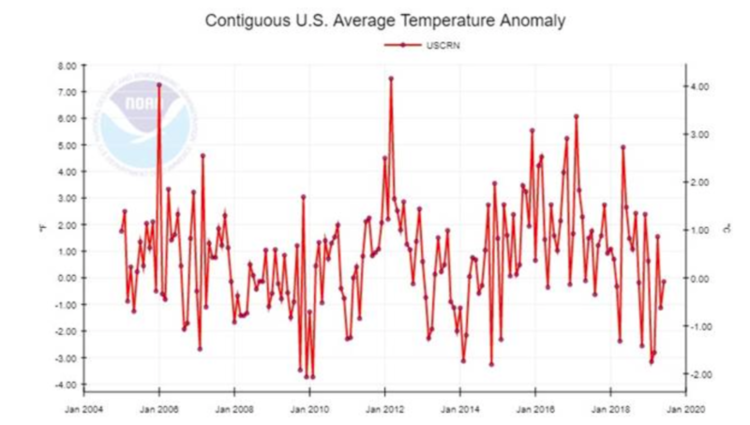When American climate alarmists claim to have witnessed the effects of global warming, they must be referring to a time beyond 14 years ago. That is because there has been no warming in the United States since at least 2005, according to updated data from the National Oceanic and Atmospheric Administration (NOAA).
In January 2005, NOAA began recording temperatures at its newly built U.S. Climate Reference Network (USCRN). USCRN includes 114 pristinely maintained temperature stations spaced relatively uniformly across the lower 48 states. NOAA selected locations that were far away from urban and land-development impacts that might artificially taint temperature readings.
Prior to the USCRN going online, alarmists and skeptics sparred over the accuracy of reported temperature data. With most preexisting temperature stations located in or near urban settings that are subject to false temperature signals and create their own microclimates that change over time, government officials performed many often-controversial adjustments to the raw temperature data. Skeptics of an asserted climate crisis pointed out that most of the reported warming in the United States was non-existent in the raw temperature data, but was added to the record by government officials.
The USCRN has eliminated the need to rely on, and adjust the data from, outdated temperature stations. Strikingly, as shown in the graph below, USCRN temperature stations show no warming since 2005 when the network went online. If anything, U.S. temperatures are now slightly cooler than they were 14 years ago.

Temperature readings from 2005 (far left) to the present (far right) show absolutely no warming.
Climate activists frequently visit or mention particular regions, states, or places in the United States and claim warming impacts are evident, accelerating, and unmistakable. Yet how can that be when there has been no warming in the United States since at least 2005?
Unfortunately, when politicians and climate activists claim they can see the impacts of climate change in a particular place, the media rarely question them on it and tend to accept the claims at face value. But the objective temperature data show no recent warming has occurred.
There is also good reason to believe U.S. temperatures have not warmed at all since the 1930s. Raw temperature readings at the preexisting stations indicate temperatures are the same now as 80 years ago. All of the asserted U.S. warming since 1930 is the product of the controversial adjustments made to the raw data. Skeptics point out that as the American population has grown, so has the artificial warming signal generated by growing cities, more asphalt, more automobiles, and more machinery.
If anything, the raw temperature readings should be adjusted downward today relative to past temperatures (or past temperatures adjusted upward in comparison to present temperatures) rather than the other way around. If raw temperature readings are the same today as they were 80 years ago, when there were fewer artificial factors spuriously raising temperature readings, then U.S. temperatures today may actually be cooler than they were in the early 20th century.
The lack of warming in the United States during the past 14 years is not too different from satellite-measured global trends. Globally, satellite instruments report temperatures have risen merely 0.15 degrees Celsius since 2005, which is less than half the pace predicted by the United Nations Intergovernmental Panel on Climate Change climate models.
Climate crisis advocates attempt to dismiss the minor satellite-measured warming by utilizing ground temperature stations around the globe, which tend to have even more corrupting biases and problems than the old U.S. stations. Of course, they adjust those readings, as well. Perhaps the time has come for American officials to direct some of the billions of dollars spent each year on climate-research and climate-change programs to building and maintaining a global Climate Reference Network.
Either way, it is becoming increasingly difficult for American politicians and climate activists to say they can see the effects of warming temperatures in the United States. For at least the past 14 years, there have been no such warming temperatures.
James Taylor (JTaylor@heartland.org) is director of the Arthur B. Robinson Center for Climate and Environmental Policy at The Heartland Institute.

No comments:
Post a Comment